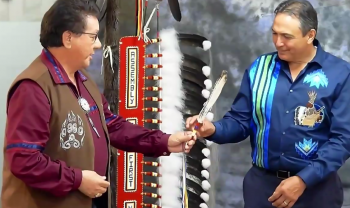Image Caption
Summary
Local Journalism Initiative Reporter
Windspeaker.com
The Assembly of First Nations will go ahead with electing a new national chief July 7 despite the strong possibility that less than half of the 633 chiefs representing First Nations from coast to coast to coast may cast ballots.
In fact, only 166 chiefs were online or on the telephone to vote on a resolution that called for the virtual election to be postponed until late fall or early winter. The resolution was defeated by a vote of 103 against and 60 for; three chiefs abstained.
It’s that low turnout that caused Chief Lance Haymond of Kebaowek First Nation in Quebec to speak out in support of the resolution, which was the first order of business on July 6, the first day of the three-day annual general assembly.
“Here’s my problem. When we only have 20 per cent of the chiefs in this country on this call, voting on resolutions and, ultimately, choosing the national chief, I’m not very comfortable in feeling that that national chief will have a very strong mandate and is representative of First Nations across this country,” said Haymond.
He said this would be the seventh time he participated in the election of a national chief and every previous election had 500 to 600 chiefs voting.
“As important as election for national chief is, there are issues that communities and nations are dealing with that are just as important, if not more so, because they’re dealing with people’s lives, people’s futures, and the priority is there,” said Haymond.
Chiefs from British Columbia were vocal in pushing for the election to be postponed, with Khelsilem of Sḵwx̱wu7mesh Úxwumixw moving the motion.
Khelsilem outlined the critical situation B.C. chiefs were facing at this time, including wildfires, evacuations and loss of homes, all on top of the year-long COVID-19 pandemic concerns. He also said they were grieving from locating the remains of 215 children at the former residential school in Kamloops.
“Holding this election right now without a broad level of participation for First Nations across this country is detrimental to the success of both the AFN and to the success of the many issues delegates to the AFN work together to achieve to benefit all of our nations,” said Khelsilem.
Kukpi7 Judy Wilson of Neskonlith went a step further calling out the AFN for not adhering to correspondence it had been receiving since December to postpone the election.
However, on May 11, the AFN executive did discuss the issue and voted against postponing the virtual election for national chief.
Wilson said that just over 50 of the 204 chiefs in B.C. had registered for the assembly and that was “problematic.” She said many communities had declared states of emergency and she wondered what the guidelines said about voting for a national chief in such a situation.
However, those supporting going forward with the election pointed out that there were always challenges facing First Nations.
“We’re in the midst of a crisis. We need a leader to continue the work,” said Chief Leroy Denny of Eskasoni First Nation, Nova Scotia.
“We have to contain and push along in regards to the election. Moving along and forward, I think we need that direction as soon as possible both from the new AFN chief and working diligently with the chiefs across Turtle Island,” said Chief Wally Burns of James Smith Cree Nation in Saskatchewan.
Chiefs in favour of the election going ahead also referenced the time and effort spent by the seven candidates for national chief.
“To postpone it, all the work these candidates have done over a course of a few months will be all for nothing. I’m really feeling sorry for the candidates if we do have to postpone the election again. They’re ready. They’re ready to go. And I know that here in Saskatchewan we’re ready to vote on the national chief of the AFN,” said Chief Marcel Head of Shoal Lake Cree Nation.
Chiefs representing almost every province spoke out on the issue.
Chiefs from B.C. and Yukon supported postponing the election. The resolution was seconded by Chief Dana Tizya-Tramm, Vuntut Gwitchin First Nation, Yukon.
Other chiefs speaking from Alberta, Saskatchewan, Ontario, Prince Edward Island, Nova Scotia rejected the delay.
Voting will take place Wednesday.
The majority of chiefs are expected to vote online but some will be voting by telephone, said Chief Electoral Officer Ron Laufer. Chiefs have until 2 p.m. EDT to register for voting, with the first vote expected to end by 3 p.m. EDT. Results will be announced an hour later.
If a second ballot is required, said Laufer, that voting will occur around 5 p.m. EDT.
If a third ballot is required, it won’t occur until Thursday, he said.
For a new national chief to be selected, he or she must earn 60 per cent of the vote.
Candidates running to replace outgoing National Chief Perry Bellegarde are RoseAnne Archibald, Reginald Bellerose, Jodi Calahoo-Stonehouse, Lee Crowchild, Alvin Fiddler, Kevin Hart and Cathy Martin.
Bellegarde decided not to seek a third consecutive term in the position.
Local Journalism Initiative Reporters are supported by a financial contribution made by the Government of Canada.

